The "well -off headlines" five Chinese companies announced at the same time that they started to delist from the United States. What was the reason?
Author:China Well -off Time:2022.08.15
On August 12, five companies including China Petroleum, Sinopec, China Aluminum, China Life, and Shanghai Petrochemical issued an announcement that they applied for voluntarily to voluntarily hold their deposit shares (hereinafter referred to as "deposit shares") Delist. Why do these companies delist from the United States? How will it be arranged after delisting? It has become the focus of attention.
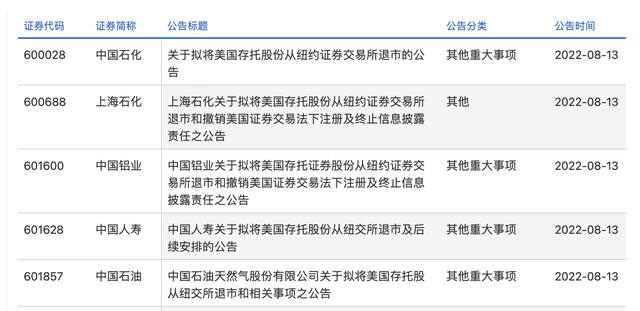
Screenshot source: Shanghai Stock Exchange official website
Five major Chinese enterprises delist at the same time
China Life announced that "the company intends to submit a form 25 form 25 form 25 forms to the US Securities and Exchange Commission on August 22, 2022 to delist from the company's deposit shares from the NYSE. Effective after the 10th. The last date of the deposit stock on the New York Stock Exchange is expected to be September 1, 2022. Since this date, the company's deposit shares will no longer be listed and traded on the NYSE. "
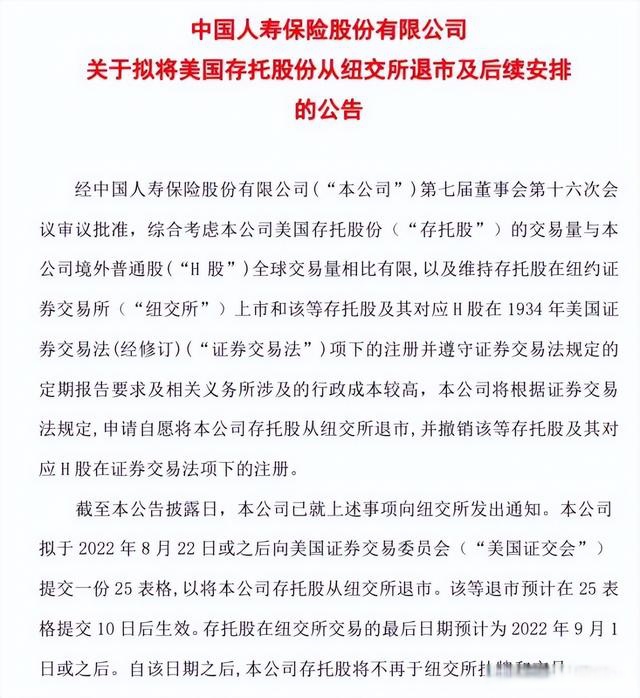
China Petroleum Announcement: "The company intends to submit Table 25 to SEC on August 29, 2022 or before and after. The final trading date of the deposit stock on September 8, 2022 or around the NYSE is on September 8, 2022. This date and since the date, the company's depository shares are no longer listed on the NYSE. "
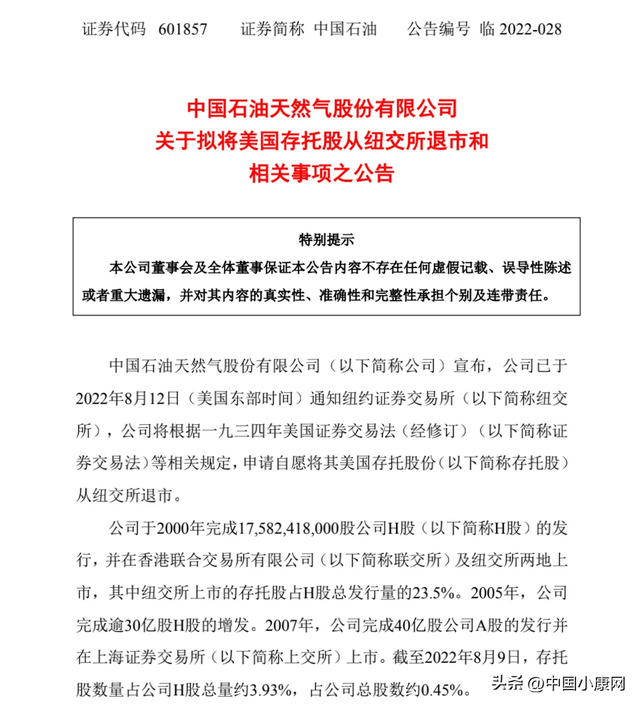
Sinopec Announcement: "The company intends to submit a form 25 form 25 form 25 forms on August 29, 2022 to delist its deposit shares from the New York Stock Exchange. Effective daily. After the effective date and the date of effect, the company's depository shares are no longer listed on the NYSE. "
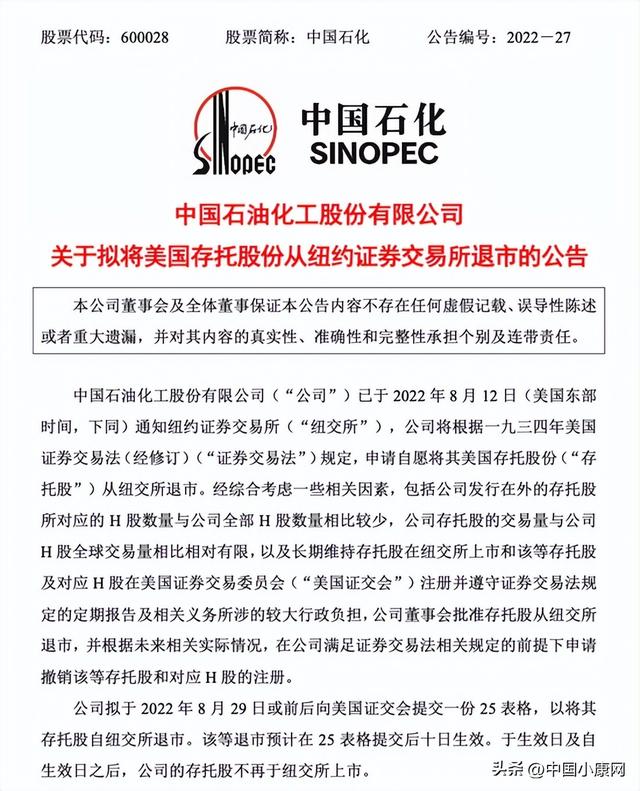
China Aluminum Announcement: "The company intends to submit a form 25 form 25 to the US Stock Exchange on August 22, 2022 to delist its deposit shares from the NYSE. These delisted markets are expected to submit ten ten in Top 25 to ten Effective in the future. The last date of the deposit stock on September 1, 2022 or around the New York Stock Exchange. On this date and since the date, the company’s depository shares will no longer be listed on the NYSE. Whether U.S. depository shares will be traded in the overseas trading market will depend on the actions of shareholders and independent third parties, and do not involve the company's participation. "
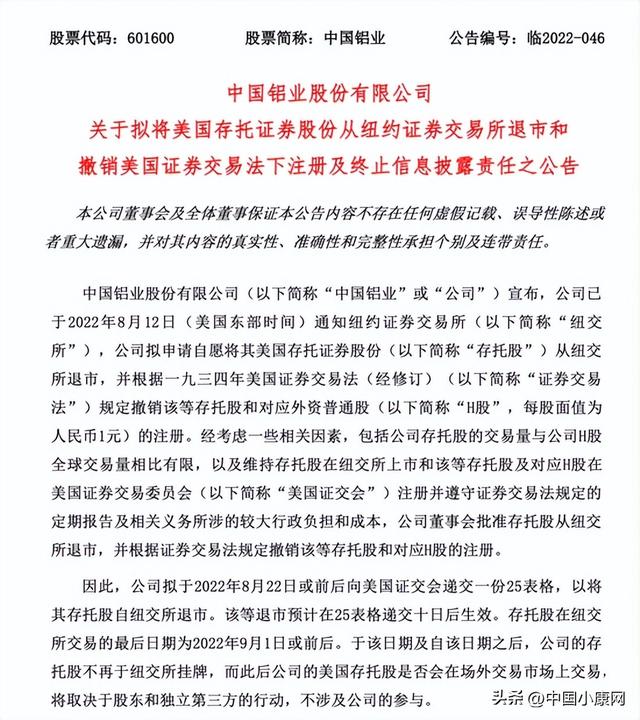
In addition, on August 12, Shanghai Petrochemical Co., Ltd. announced in the Hong Kong Stock Exchange that the company had notified the New York Stock Exchange on August 12, 2022 to voluntarily represent the company's company H in accordance with the 1934 US Securities Trading Law (revised) The US deposit shares are delisted from the New York Stock Exchange, and the registration of registered registration and termination of its reporting obligations to the US Securities and Exchange Commission after the legal conditions are mature.
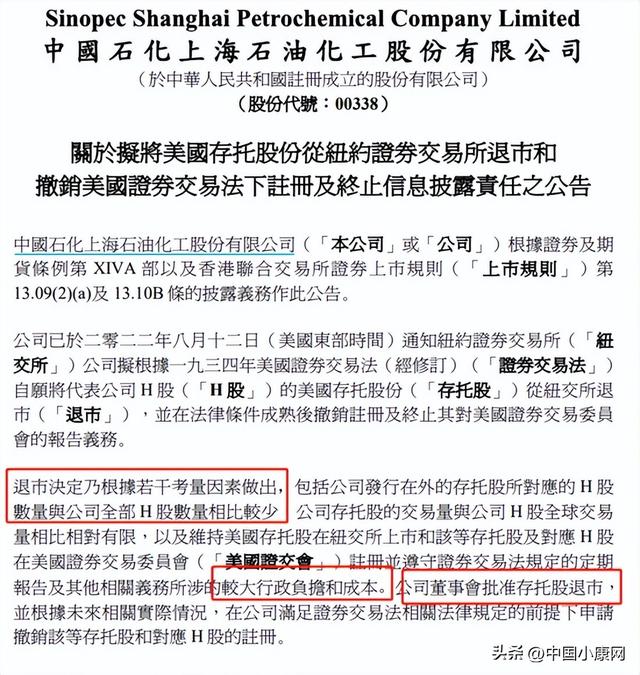
Discover the reason for delisting
It can be seen that the reasons for the delisting disclosed in the announcement in the announcement are basically the same. There are two main: there are two main:
First, the proportion of US deposit stocks accounted for a small proportion of the company's H shares and total shares, and the transaction volume was lower than the company's global transaction volume.
Second, maintaining the listing of US deposit shares on the NYSE, the registered shares and the corresponding H shares register and comply with the regular reports and related obligations stipulated by the US Securities Exchange Law on the US Securities Exchange Law. The administrative burden and costs involved are big.
In addition, PetroChina also said that the company has never used the NYSE secondary financing function, and the Stock Exchange and Shanghai Stock Exchange have strong replaceability, which can meet the company's normal operation of financing needs.
As we all know, since March of this year, the US regulatory authorities have listed 159 Chinese stocks in the "pre -delivery list" through the so -called "Foreign Company's Accountability Law".
China Petroleum, Sinopec, China Life, China Aluminum, Shanghai Petrochemical and other companies applying for delisting in batches is another major incident in the US securities market from China Mobile, China Unicom, and China Telecom.
Five companies follow -up arrangements
What specific arrangements will the above five companies will be disclosed in the announcement. On the whole, the time arrangement of the five companies is not the same, but they are concentrated in August this year.
China Aluminum and China Life intends to submit relevant documents to the American Stock Exchange Fair to the US Stock Exchange Fair on August 26 on August 26 on August 26. Sinopec and PetroChina. After the file is submitted, it takes effect 10 days.
After the deposit shares delist from the New York Stock Exchange, where will the above five companies keep the transaction? Reporters of the FCSC noticed that some companies have also explained. It is understood that after the delisting of PetroChina Stock Stocks from the New York Stock Exchange, it will continue to retain the Stock Exchange and Shanghai Stock Exchange as the trading market of the company's stock. The holders of the depository shares can replace the deposit shares back to H shares to trade on the Stock Exchange.
After the termination of China Life's deposit certificate project in the United States, the deposit shares and its corresponding H -shares cancellation registration, the company has not planned to seek the listing or registration of its H shares on the other nationwide national stock exchange H -shares quotation. The company's H shares will continue to trade on the Hong Kong Stock Exchange.
However, it is worth mentioning that the above -mentioned enterprises also pointed out that before the above submission of effectiveness, the company reserves its delay or withdraw all the rights submitted above.
Hu Xijin talked about a number of central enterprises withdraw from the US stock market
In this regard, Hu Xijin commented: must accurately understand the meaning of their delisting from the United States, neither underestimation nor the meaning.
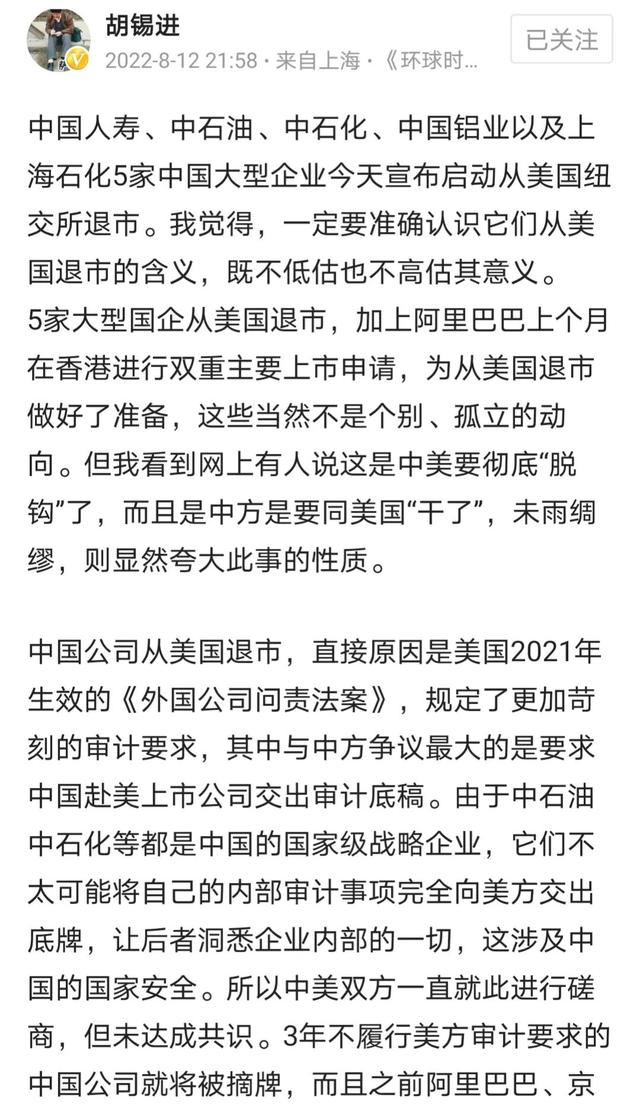
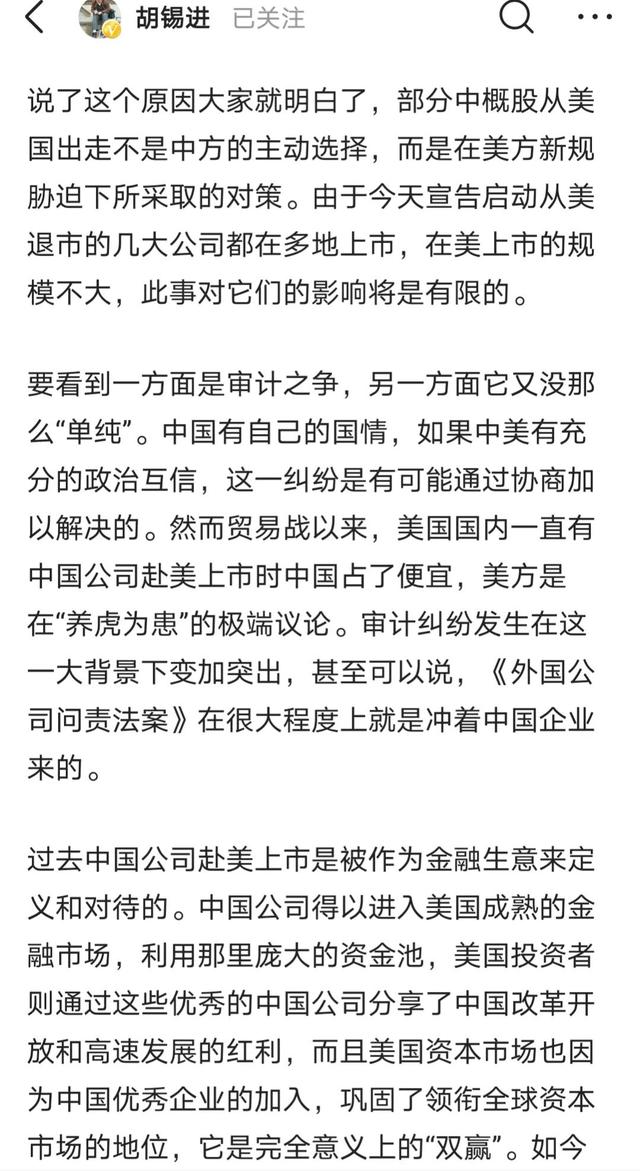

Hu Xijin was the chief editor of the Global Times. On December 16, 2021, he announced his retirement.
Response of the CSRC: Respect the decision made by the enterprise
The person in charge of the relevant departments of the CSRC stated that some Chinese companies announced their offering from the United States, saying:
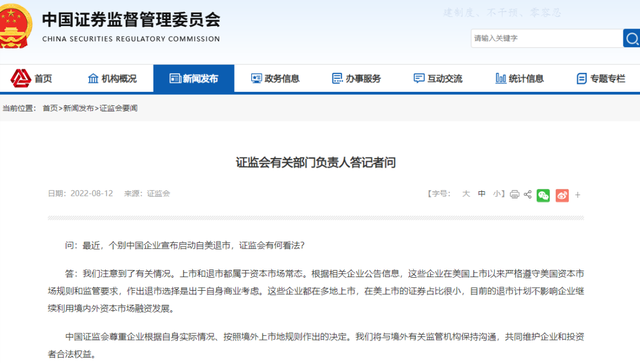
We noticed the situation. Listing and delisting belong to the normal capital market. According to relevant companies' announcement information, these companies have strictly abide by the US capital market rules and regulatory requirements since the listing of the United States, and make delisting options for their own business considerations. These companies are listed in many places, and the proportion of securities listed in the United States is very small. The current delisting plan does not affect the continued use of domestic and foreign capital market financing and development. The China Securities Regulatory Commission respects the decision made by enterprises in accordance with its actual situation and in accordance with the rules of overseas listing. We will maintain communication with relevant overseas regulatory agencies to jointly safeguard the legitimate rights and interests of enterprises and investors.
Yu Shilin, manager of Huasheng Securities Research Department in Hong Kong, said in an interview with the Global Times reporter on the 12th that, as the company announced and responded to the CSRC, the trading volume of these listed companies in the New York Stock Exchange was relatively small, and the financing function was not outstanding. In order to maintain more work or costs to maintain it in the United States, it will be worthless. From this perspective, this is indeed a voluntary delisting behavior, which has nothing to do with the United States' suppression of Chinese stocks in the financial market. However, Yu Shilin said that in the context of the United States' increase in Chinese stocks, the actions of the five companies can avoid some risks in advance. He believes that as the United States has stricter the regulatory policy of China stocks, the audit risks facing Chinese companies will increase, and the audit costs that enterprises need to pay and the risks of data security cannot be ignored. Yu Shilin said: "If the United States increases the accounting review of Chinese companies, or it must be implemented by a US company or an accounting firm in the United States, then the listed company will generate a very expensive expenditure. Weighing the advantages and disadvantages. It is necessary to maintain listing on the NYSE. "
Gao Lingyun, a researcher at the Institute of Economics and Political Sciences of the Chinese Academy of Social Sciences, told the Global Times reporter that the delisting options of five companies are rational, and in the future may make the same choice in other Chinese companies. He believes that the United States' acts of suppressing Chinese stocks for political purposes will affect the credit of the US securities market, because a financial market mixed with political purposes will also make other foreign companies scruple, which will eventually affect the United States in the global financial market in the world. Influence.
(Xiaokang Headou Comprehensive Securities Regulatory Commission website, Chang'an Street Knowledge, Global Times, Daily Economic News, Financial Association, Hu Xijin Weibo)
Edit: Wang Fang
School pair: Tian Yuan Yingying
Review: Gong Zimo
- END -
【Good Pin Shandong】 Shandong "Eat Gourd" Illustrated Book

As a province with the top ranking of selling melon and eating melon, Shandong is ...
In order to meet the needs of production and operation, Zhongyu Guangheng intends to apply for a total of 20 million yuan in loans to the bank
On July 22, 2022, Zhongyu Guangheng (836708.NQ) issued an announcement on applying for loans and affiliated transactions to the bank.Henan Zhongyu Guangheng Technology Co., Ltd. (hereinafter referred